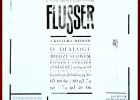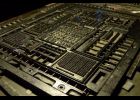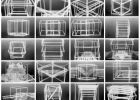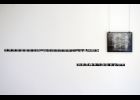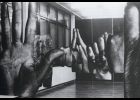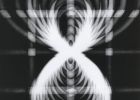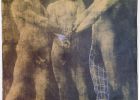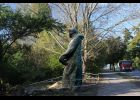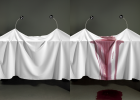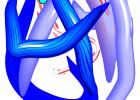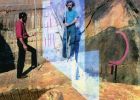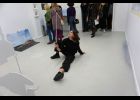Flusser Studies 27 – May 2019 / Special Polish Issue
Expanding Photography – Flusser and Polish Intermedia Photography
The essay explores the reasons for the popularity of Vilém Flusser’s ideas on media and history in Polish photography at the end of 20th century. Flusser’s concepts fit perfectly into the thinking about photographic images, which in the 1990s became the leading trend in Central and Eastern Europe. The philosopher’s comments on the “creative gesture” of the photographer, the concept of the universe of technical images, and, above all, the freedom of the artist found a positive response among artists whose art originated in conceptual, performative and “expanded photography” approaches, and created a good foundation for cooperation between artists and academics. Such approaches towards photography gave rise to intermedia photography, which expanded the boundaries of the medium, drawing attention to its formal and socio-cultural context. Furthermore, the paper focuses on photographical case studies by two Polish artists who actively employed Flusser’s vision of media in their art: Stefan Wojnecki and Piotr Wołyński.
Von der telematischen Gesellschaft zur retrotopischen Stammesgemeinschaft: Zbigniew Libera’s Film Walser (2015)
This essay uses Vilém Flusser’s reflections on the medium of video to examine the work of the Polish visual artist Zbigniew Libera focusing on his latest film Walser (2015), his first and only feature film for cinemas. The film is set in a post-apocalyptic age. Only one tribe has survived which lives peacefully and harmonically with nature at the margins of civilization. One day, a stranger visits it. The aim of the essay is to explore the portrayal of the tensions between individual and collective in the film in order to reconstruct Libera’s idea of a community based on the principle of dialogue, an idea that can be compared to Flusser’s own vision of the future and his theories of cultural history. In the last part of the essay I try to interpret Libera’s deconstructionist approach using Zygmunt Bauman’s concept of retrotopia.
Flusser, Media Theory and I. From the Genealogy of Thought
This essay is a case study of a coincidence both in terms of a personal perspective of the author’s encounter with Vilém Flusser’s philosophical and theoretical thought, and with regard to notions of necessity, destiny, and fate. In the present essay, this type of randomness is called ‘primordial accidentalism’. The author discusses his experiences in applying Flusser’s concepts of apparatus, alphanumeric society and technical images, to the creation of concepts referring to digital photography, new media, new media art, cyber-culture and techno-culture. Moreover, the author recalls his experiences with the two Polish editions of Towards a Philosophy of Photography (2004 and 2015), which undoubtedly contributed to the popularization of Flusser’s philosophical concepts among artists, media theorists and philosophers.
Biomedia and Anthropology of Gestures and Body
The essay is based on two central notions developed by Vilém Flusser: 1) life can be considered as a design project; 2) we are in need of a new anthropology of gestures. It moves from the modern understanding of technology, digital media and its cybernetic regime, to discover biomedia and their ability to invade and conquer bodies, senses and gestures. In the light of this new bio-techno-cultural constellation where media are used to design gestures, old questions about subjectivity, media and communication remain fundamental yet they ought to be reinterpreted.
Vilém Flusser’s Technical Image: Performative Inspirations
This essay explores the relevance of Vilém Flusser’s work for performance studies, a discipline that is based on philosophy of language, anthropology, as well as on the study of theatrical phenomena and everyday practices. Is there a possible kinship between Flusser’s concept of technical image and the broader category of performance?
In Search of the Other – Vilém Flusser and Dialogical Life / In the Shadow of Post-History – Introduction to the Philosophy of Vilém Flusser
How does the philosophy of Vilém Flusser present the subject of moral values? Can we talk about Vilém Flusser’s ethics? Who is the Other and how do we engage with him/her? Flusser’s philosophy, especially the notion of dialogue, attempt to give an answer to these fundamental existential, moral, and social questions that our postmodern world is confronted with. Interestingly enough, Flusser’s philosophy describes the experience of meeting the Other starting out from a reflection on media.
From God’s Death and Nothingness to the Re-Creation of the World: Vilém Flusser’s Intertextual Games
The essay deals with several motifs of Vilém Flusser’s philosophy focusing on the notion of nothingness – ontological horizon, conversation and establishment of being. The essay attempts to reconstruct the fundamentals of Flusser’s theory of being, based on an analysis of his fragmentary statements, which form a coherent whole grounded in a utopian vision of information society influenced by Aristotle, Kant, Nietzsche, Heidegger, Ingarden, Sartre and Levinas. Flusser’s writings are intertexts full of more or less concealed allusions, transformations, and polemics, as well as of congenial convergences with texts and ideas of other authors.
